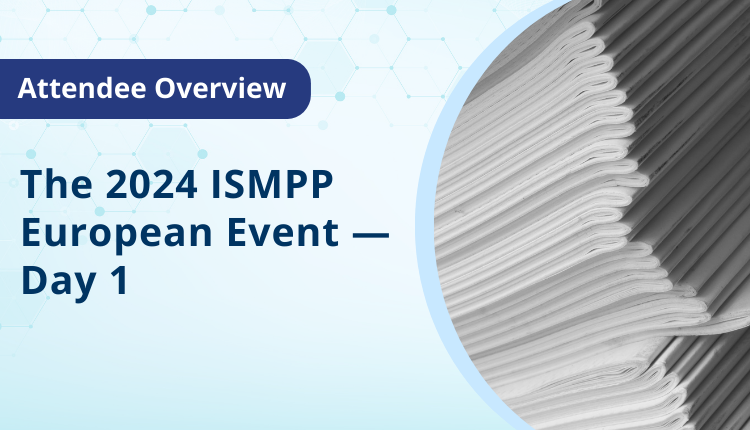On January 23rd, the International Society for Medical Publication Professionals (ISMPP) commenced its European conference in London, a gathering that extended through January 24th, 2024. Under the banner “Innovation: The New Tradition,” the event attracted an unprecedented 395 participants.
I attended ISMPP EU 2024 as a first-time attendee, a poster presenter, and a booth sponsor on behalf of Enago Life Sciences. I met so many interesting people and also managed to attend some really interesting sessions and round tables in addition to engaging with other attendees at our booth.
Through the next few pieces, I will try to recap some of the crucial discussions and sessions as well as my experiences at the conference.
Highlights from Day 1 (Part 1)
1. Introduction & Presidential Speech by ISMPP
The event was initiated by Eleanor Raynsford (Chair, ISMPP European Programme Committee, IPSEN), who greeted the attendees and expressed gratitude towards the organizing committee and the ISMPP staff. Raynsford noted the progressive increase in event participation, abstract contributions, and poster displays, emphasizing the growing involvement within the ISMPP community. A charitable contribution was made to Great Ormond Street Hospital, highlighted by Raynsford.
The conference’s theme, “Innovation: The New Tradition,” was introduced by Raynsford, underscoring the necessity of maintaining ethical and operational excellence amidst industry innovations.
Ann Gordon (Vice Chair, ISMPP Certification Board; CMC Affinity) updated on the CMPP program, revealing a global spread of 1647 CMPPs, with 38% in Europe. She discussed the introduction of an online examination option and a forthcoming certification platform in late 2024. Gordon also stressed the importance of CMPP mentors.
Rob Matheis (President and CEO, ISMPP) delivered the presidential speech, touching on the dynamic changes in medical communications, including patient involvement and digital advancements. Matheis reiterated the foundational values of transparency and ethics in publishing and urged attendees to embrace the future responsibly.
The future of medical publications, Matheis argued, hinges on accountability and the ethical deployment of emerging technologies like AI. Sharing a personal anecdote, Matheis illustrated the significant impact medical literature can have on patient outcomes. He concluded with a progress report on ISMPP’s growth and innovations, inviting members to actively participate in the society’s initiatives.
KEY INSIGHTS
- The society observes a steady climb in membership and Certified Medical Publication Professional (CMPP) certifications annually.
- It’s pivotal for professionals in medical communications to hold onto the field’s core principles even as the landscape evolves and adapts to new industry shifts.
2. MedComms 2030: A Visionary and Cautious Outlook
The “MedComms 2030: a blue sky and black cloud perspective” session at the ISMPP European Meeting provided contrasting visions of the future of medical communications (MedComms) through the eyes of panelists James Dathan and Bethany Whalley. Moderator Jocelyn Woodcock aimed to ignite discussion on potential 2030 MedComms scenarios, encouraging debate without seeking definitive predictions.
From a positive “blue sky” viewpoint, Dathan envisioned a future where scientific accuracy and content integrity remain central, with innovations enhancing delivery and personalization of manuscripts. All journals would adopt open access, and artificial intelligence (AI) would streamline the development of patient-engaging materials, including plain language summaries (PLS). This future also envisaged increased patient involvement in publications and a seamless integration of virtual and augmented reality in scientific congresses, promoting deeper engagement and discussions.
Conversely, Whalley’s “black cloud” perspective offered a cautionary outlook, warning of potential pitfalls like diminished doctor-patient relationships due to overly tailored articles, and the loss of editorial independence. This perspective also highlighted the risks of excluding patients from meaningful roles due to perceived lack of authority, and the challenges of maintaining journal scope and readership amidst growing patient authorship. Moreover, sustainability regulations could push all congresses online, significantly reducing networking opportunities and engagement.
The discussion also covered social media’s evolving role in MedComms, contrasting its potential to widely disseminate scientific advances with the current hesitancy due to regulatory ambiguity and fear of misinformation.
Regarding AI, Dathan’s optimistic scenario praised its efficiency and transformative potential in content creation, while Whalley cautioned against overreliance, citing potential for significant errors and the ethical dilemma of replacing human expertise.
In concluding remarks, the panelists stepped back from their assigned perspectives, agreeing on the necessity of pushing boundaries, embracing new ideas, and prioritizing accessibility to drive innovation in MedComms by 2030. This session not only highlighted the dynamic potential of the MedComms industry but also underscored the importance of cautious optimism and proactive problem-solving as it evolves toward the next decade.
KEY INSIGHT
- Professionals in MedComms need to envision the field’s future by 2030, anticipating potential hurdles and strategies to navigate them.
3. Keynote on AI Ethics and Trust
Nell Watson, associated with the IEEE Standards Association and a recognized voice on artificial intelligence (AI) and future technologies, delivered an engaging presentation on AI’s progression and the ethical dilemmas it presents. Her discourse traced AI’s evolution from its nascent hand-coded beginnings in the 1950s, through the development of machine-learning algorithms in the 1980s, to the latest breakthroughs in generative and autonomous AI technologies.
Watson highlighted AI’s versatile applications, ranging from visual enhancements and the organization of complex data to the creation of synthetic data for protocol testing. She pointed out the ethical challenges that accompany AI’s capabilities, such as the potential for altering realities through image modification and the unauthorized use of AI systems, known as shadow AI.
Delving into AI’s transformative role in the scientific and medical arenas, Watson discussed its application in experimental design, analysis, lab work, and even the peer review process. She brought attention to notable uses, like AI’s contribution to identifying new antibiotic classes, showcasing AI’s potential to significantly advance scientific discovery and medical innovation.
Emphasizing the importance of ethical AI use, Watson advocated for adherence to principles of transparency, fairness, accountability, and privacy. These pillars, she argued, are essential for fostering trust in AI technologies that increasingly influence human lives and decision-making processes in science and medicine.
KEY INSIGHT
- The surge in AI application within the scientific sector brings to light critical ethical considerations.
4. Pharma’s Public Perception and Role of Publications
The day concluded with a comprehensive panel discussion on how medical publications influence the pharmaceutical industry’s public image. Helena Williams from CMC Connect initiated the dialogue by posing critical questions on the translation of scientific research into media stories and the role of stakeholders in shaping the pharma industry’s public perception. She highlighted the fluctuating trust in pharma, affected by both positive breakthroughs and negative scandals, and noted the challenges in assessing public opinion accurately.
Mark Robinson from Taylor & Francis addressed the biases in media reporting of medical research, suggesting ways to ensure press releases convey significant, reliable science without sensationalism or technical jargon. Rod Whiting, a news broadcaster, shared insights on selecting news stories and the potential for pharma to leverage social media more effectively, emphasizing the importance of engaging with specialist journalists. James Read from Pfizer UK underscored the pivotal role of clear, accurate medical publications in improving lives, advocating for the inclusion of expert patients in the scientific narrative to enhance doctor-patient relationships. The session underscored the importance of storytelling, data visualization, and the potential impact of AI on the accessibility and perception of plain language summaries (PLS) in medical literature.
KEY INSIGHT
- Pharma entities, publishers, and medical publication professionals must engage effectively with media to ensure that scientific advancements are accurately communicated and benefit patients.
Overall it was a really interesting start and end to Day 1. I did not get a chance to attend the other sessions because I had to present at my booth; I did however present our poster and attended a round table session on PLS. Will write about that soon!
Author:
 Dr. Anupama Kapadia
Dr. Anupama Kapadia
General Manager, Enago Life Sciences
Connect with Anupama on LinkedIn

